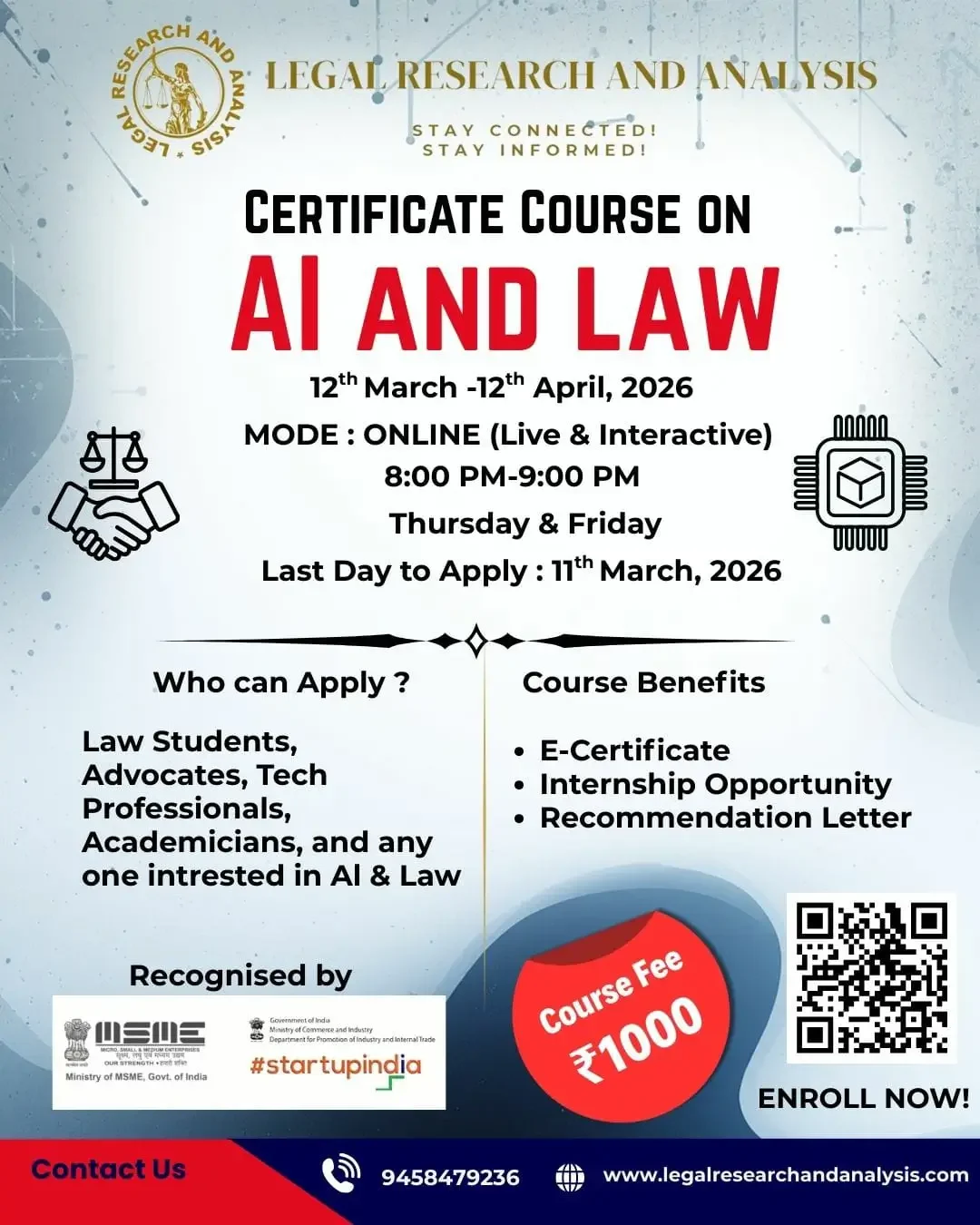

CERTIFICATE COURSE ON AI AND LAW
4.8 (461 Rating)
₹1000
Schedule
- Duration: 4 Weeks
- Frequency: Two classes per week
- Total No. of Classes: 10 (2 per week, 1 hour each)
Important Dates
- Last Date to Apply: 11-Mar-2026
- Course Start Date: 12-Mar-2026
- Course End Date: 12-Apr-2026
About The Course
Artificial Intelligence (AI) is transforming the legal landscape, reshaping how law is practised, interpreted, and enforced. This one-month certificate course is designed to provide a comprehensive understanding of the intersection between Al and law, covering regulatory frameworks, ethical concerns, and real-world applications.
Through eight interactive sessions over four weeks, participants will explore key legal issues surrounding AI, including data protection, intellectual property rights, criminal justice, and policy-making. The course is structured to benefit law students, legal professionals, policymakers, and researchers seeking to understand the legal and ethical dimensions of AI.
Comprehensive Coverage: Explore the intersection of Al and law, including regulation, ethics, and legal applications.
Expert-Led Sessions: Learn from leading professionals, legal scholars, and Al experts.
Real-World Case Studies: Analyse practical examples of Al in legal research, judicial decision-making, and law enforcement
Comparative Legal Perspectives: Understand AI regulations in India, the EU, the US, and China.
Ethical & Policy Discussions: Delve into issues like algorithmic bias, privacy concerns, and Al accountability.
Interactive Learning: Engage in discussions, Q&A sessions, and thought-provoking debates.
- Understanding Al and Law- Introduce participants to Al technologies and their implications for legal practice and governance.
- Regulatory Frameworks- Analyse existing laws and policies governing Al, including data protection, intellectual property, and criminal justice.
- Comparative Analysis Examine- AI regulations in India, the EU, the US, and China to understand global best practices.
- Ethical Considerations- Discuss issues like algorithmic bias, Al transparency, and human rights concerns.
- Practical Applications- Explore real-world use cases of Al in legal research, contract management, and dispute resolution.
- Future Perspectives- Assess the evolving landscape of Al governance and potential legal reforms.
Aims
- To provide a foundational understanding of Artificial Intelligence (AI) and its impact on the legal system.
- To explore the legal, ethical, and regulatory challenges associated with Al in India and globally.
- To equip participants with practical insights into Al’s role in legal research, judicial decision-making, and governance.
- To foster critical thinking on AI-related policy developments and legal reforms.
Course Curriculum:
Session 1: Understanding Artificial Intelligence
- Basics of Al: Definition, types, and applications
- Key concepts: Machine Learning, Neural Networks, and Natural Language Processing
- Al in the Indian and global context: Opportunities and challenges
Session 2: Al and the Legal System
- Role of Al in the judiciary (e.g., predictive justice, case law research tools)
- Applications of Al in contract management, dispute resolution, and compliance
- Ethical and moral dilemmas of Al in the legal domain
Session 3: Legal Framework Governing Al in India
- Digital Personal Data Protection Act, 2023
- IT Act, 2000, and cybersecurity regulations
- Sectoral laws (e.g., Competition Act, Consumer Protection Act) impacting Al
Session 4: Comparative Analysis of Al Regulations
- The EU AI Act: Key features and lessons for India
- US and China’s approach to regulating AI
- International principles: OECD Guidelines and UNESCO Recommendations
Session 5: Al and Intellectual Property Law
- Copyright challenges: Authorship of Al-generated works
- Patentability of Al inventions
- Trade secrets and database protection in the Al era
Session 6: Al in Criminal Justice
- Use of Al in policing: Predictive policing and surveillance systems
- Al and human rights: Issues of privacy, bias, and accountability
- Case studies: Examining Al’s role in criminal investigations and judicial decisions
Session 7: Ethical and Social Implications of Al
- Algorithmic bias and discrimination
- Transparency and accountability in Al systems
- Al and the right to privacy: Striking a balance
Session 8: The Future of Al and Law
- Emerging trends in Al and its impact on the legal profession
- Regulating Al responsibly: Policy suggestions for India
- Group discussion: Debating the role of Al in enhancing access to justice
Who Should Apply?
Law students, legal professionals, academicians, policymakers, and technology enthusiasts
Assessment and Certification
- Final Assignment: Write a 1,000-word analysis on any one aspect of Al and law.
- Certificate: Awarded upon completion of all sessions and submission of the assignment
Mentors
UGC NET Qualified, Practicing Advocate & Teaching Associate

Mr. Pranav Jha
Mr. Pranav Jha was serving as a Junior Research Consultant at the National Human Rights Commission. He has completed his LL.M (Access to Justice) from Tata Institute of Social Sciences, Mumbai.
He has graduated in Law- {B.A.LL.B (Hons.)} with distinction from Aligarh Muslim University, Murshidabad Centre (W.B). He has been very dedicated to his academic excellence. He was a student representative at CDFC, TISS.
Perks
- E-Certificate on Completion
- Internship Opportunity
- Letter of Recommendation
Contact Us
- Call: 9458479236
- Mail: contact.lra24@gmail.com
- Address: D2, New Friends Apartment, Sir Syed Nagar, Aligarh, Uttar Pradesh, India. Pin-202001.
- Our testimonial






